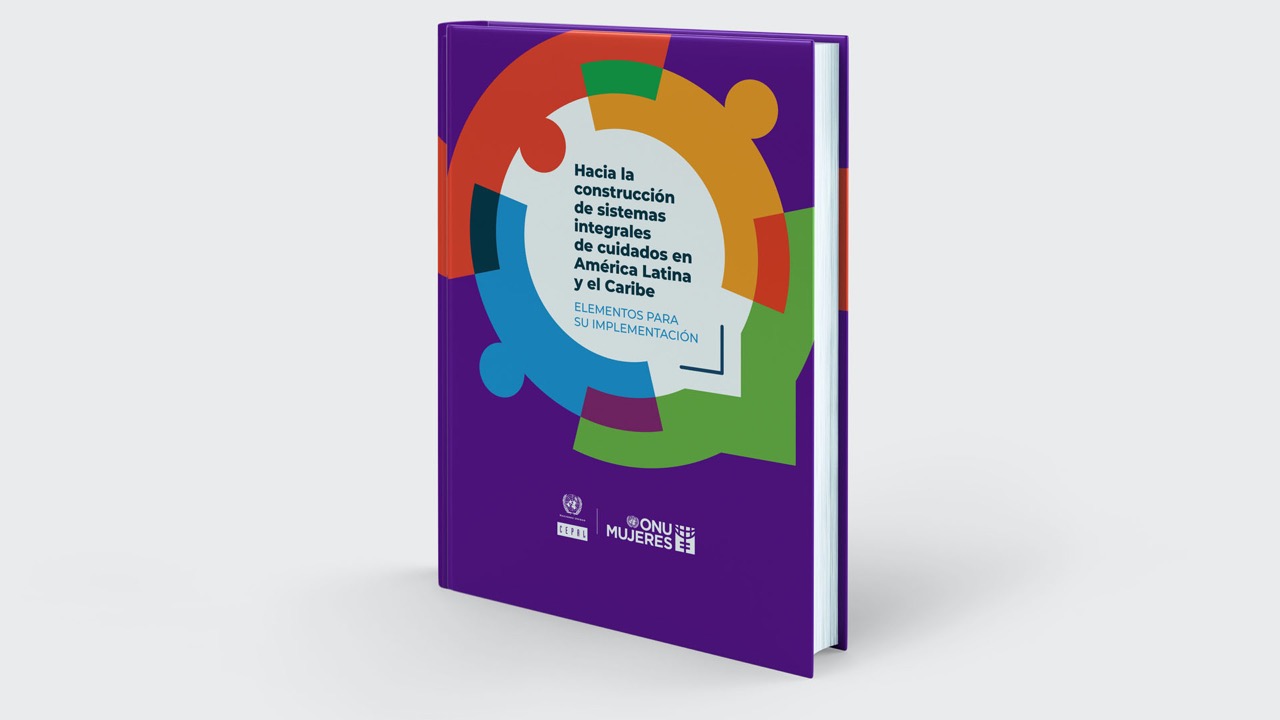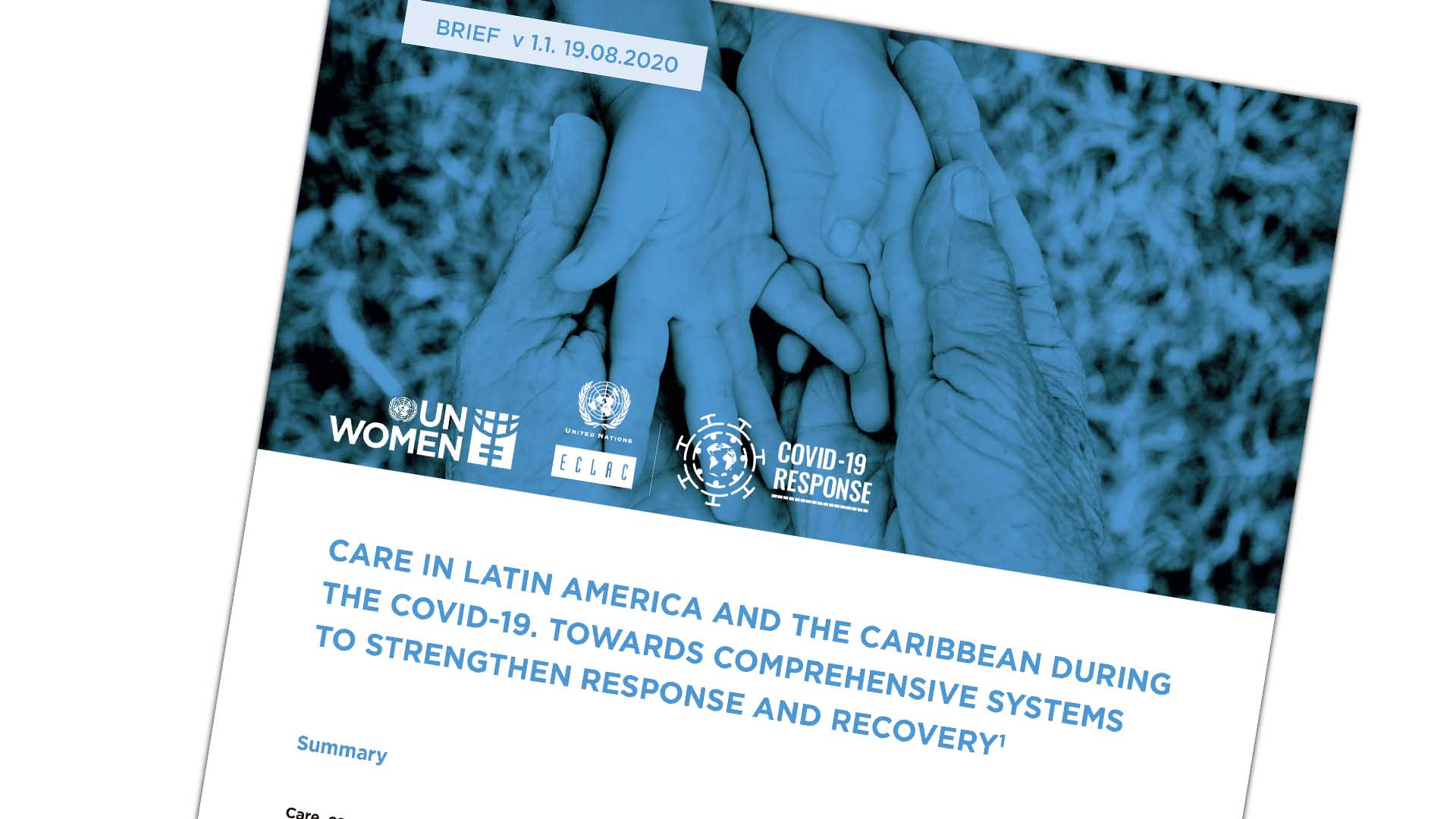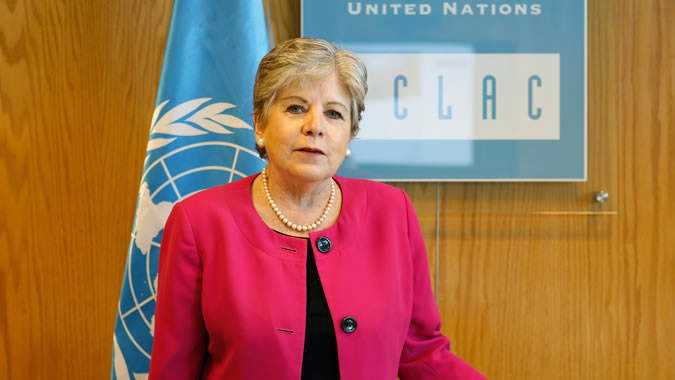UN Women and ECLAC promote the development of Comprehensive Care Systems in Latin America and the Caribbean
Work area(s)
UN Women's Regional Director, María Noel Vaeza and ECLAC Executive Secretary, Alicia Bárcena, and the Director of the Division of Gender Affairs, Ana Güezmes, presented the joint document titled Towards the construction of comprehensive care systems in Latin America and the Caribbean.

The United Nations Entity for Gender Equality and the Empowerment of Women (UN Women) and the Economic Commission for Latin America and the Caribbean (ECLAC) presented the report Towards the construction of comprehensive care systems in Latin America and the Caribbean. Elements for implementation, in an event organized with the support of the Global Alliance for Care. The document aims to contribute to the analysis and reflection to advance in the implementation of Comprehensive Care Systems and to move towards a Care Society that prioritizes the sustainability of life, placing it at the center of policies for the achievement of the 2030 Agenda for Sustainable Development and the Regional Gender Agenda.
The document, prepared by Julio Bango and Patricia Cossani, UN Women consultants, addresses key issues such as the importance of investing in care and the benefits that this investment represents in terms of the advancement of rights, the elimination of social inequalities, and the achievement of gender equality, the dynamization of the economy and the sustainability of development. Based on the lessons learned from experiences in Latin American and Caribbean countries, it addresses elements worth considering in the construction of Integrated Care Systems, such as the definition of the target population, the guiding principles, and their components. The document identifies possible political governance and intersectoral management scheme to ensure the national-local articulation required by an integrated care system.
The COVID-19 pandemic has reaffirmed the centrality of care, highlighting the unsustainability of its current distribution. Since before the pandemic, women in Latin America and the Caribbean dedicated three times as much time as men to unpaid care work. UN Women and ECLAC have proposed promoting comprehensive care systems for several years and with more emphasis since 2020 in the joint report Care in Latin America and the Caribbean in times of COVID-19. Towards Comprehensive Systems to Strengthen Response and Recovery.
"When we propose to governments to promote Comprehensive Care Systems we refer to the series of policies aimed at concretizing a new social organization of care with the purpose of caring, assisting and supporting people who require it, as well as recognizing, reducing and redistributing care work, from a human rights, gender, intersectional and intercultural perspective," said María Noel Vaeza. Emphasizing the importance of these policies being conceived from a public policy perspective, she said: "In order for these care policies to become a system, it is also necessary to develop a governance model that includes inter-institutional articulation -at the national and territorial levels- among all the institutions that implement actions aimed at the care of different target populations, as a way to efficiently take advantage of the installed capacities at the state and social levels, thus developing a management model that tends to move "from the logic of services to the logic of people."
For her part, ECLAC Executive Secretary Alicia Bárcena stated that "The crisis resulting from the COVID-19 pandemic has affected women's living conditions, activity levels, employment, and income, deepening the structural causes of gender inequality and seriously undermining women's economic autonomy, which has been achieved in recent decades. Moving towards a care society implies a paradigm shift that places at the center, the care of people, of those who care, self-care and care for the planet."
"The document we are presenting today will be a key input to continue building consensus and contributing to the debate with that will lead to the XV Regional Conference on Women in Latin America and the Caribbean to be held during the last quarter of 2022 in Argentina under the theme 'The care society: horizon for a sustainable recovery with gender equality, '" said Bárcena.
After the welcoming remarks by the Executive Secretary, Alicia Bárcena, and the presentation by María Noel Vaeza and Ana Güezmes, a panel of proposals "Towards comprehensive care systems" was held, moderated by the Deputy Regional Director of UN Women, Cecilia Alemany, which brought together specialists and high-level decision-makers to present guiding experiences for the development of these systems. Nadine Gasman, President of the National Institute of Women of Mexico, Elizabeth Gómez Alcorta, Minister of Women, Gender and Diversity of Argentina, Sharon Coburn Robinson, Senior Director of the Bureau of Gender Affairs, Ministry of Culture, Gender, Entertainment and Sport of Jamaica, Louise Holt, Director General of Social Development and Global Affairs of Canada and Marisol Touraine, Specialist Area of Gender Equality Policies, EUROsociAL+, participated in the exchange and shared progress.
ECLAC and UN Women thus propose consolidating national care systems as the fourth pillar of social protection to contribute to an inclusive and transformative recovery that does not continue to reproduce gender inequalities and the monetary and time poverty that affects women and even more so those women who face multiple forms of discrimination.
Although it may sometimes be understood that the development of Comprehensive Care Systems should be a task to be undertaken after the objectives of overcoming poverty and reducing inequalities have been successfully addressed, in reality, this is a fundamental task for achieving them and should be conceived as the development of one more vector - together with employment, health, education, and housing policies - in a successful strategy for achieving results.
Investment in care systems and infrastructure contributes directly to the well-being of people in general and women in particular due to the excessive weight of the care they are responsible for, primarily if the quality of community, public and private services that provide care is regulated and monitored.
With this launch, ECLAC and UN Women are calling to raise awareness of the importance of care in the current crisis and its crucial role in a transformative and sustainable response and recovery. Placing care at the center of the social, economic, and political agenda is essential for achieving equality.
Related content

ECLAC and UN Women: Comprehensive Care Systems are Key to the Socioeconomic Recovery in Latin America and the Caribbean
The Executive Secretary of the Economic Commission, Alicia Bárcena, and the Regional Director of UN Women, María Noel Vaeza, presented a joint document entitled Care in Latin America and the…

ECLAC Reaffirmed its Commitment to the Global Alliance for Care Work, an Initiative that Gives Visibility to Latin America and the Caribbean’s Pioneering Efforts in this Area
Alicia Bárcena, the regional organization’s Executive Secretary, participated in a virtual gathering organized by the National Women’s Institute of Mexico and UN Women.
Type
Country(ies)
Related link(s)
Contact
Public Information Unit
- prensa@cepal.org
- (56 2) 2210 2040
